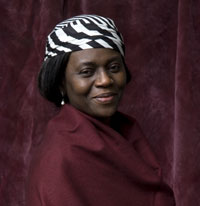2005 Summer Institute in Reproductive Health and Development
There is a Nigerian folksong that begins, “Walk with the people, not for the people,” and, says Maryam Ibrahim Babangida, it neatly sums up her approach to philanthropy.
Madame Babangida, the founder and executive chair of the Better Life Programme in Nigeria, was at the School July 5–15 to attend the Gates Institute's 2005 Strategic Leadership Seminar. She says that she has always had a “passion for assisting the voiceless, the powerless,” and that the secret to succeeding in this desire is to first work with rural villagers from the bottom up, not by implementing projects from the top down.
This natural bent for humble, side-by-side assistance has gotten a good bit of validation this week from the presenters at the Gates Strategic Leadership Seminar.

Maryam Ibrahim Babangida
Even when Madame Babangida’s husband became the president of Nigeria in the 1980s, she went right on working with the poor. “My husband happened to be president. This gave me more opportunities perhaps, opened some more doors for me, but I kept my senses,” she says.
“Development should start with rural and go to urban; this will stop the migration to the cities,” says Madame Babangida. Thus, she says, Western donor organizations that come bustling into a developing country and insist, for instance, that women henceforth give birth inside sterile hospitals, are misinformed. “Start first with a grassroots, rural clinic, and allow development to happen naturally from there. If you start with a grand hospital, it will be too unknown, and the people will run away.”
Likewise, she notes that if a country such as the United States tries to be the world’s policeman and the leader of everything, “there is the chance that you can also be a leader of sin.”
What could the average American learn from the people of Africa? “The average American needs to be more understanding, needs to know that blacks have sense and a knowledge of what they want. We have to partner together. Your technology is tremendous here, but I want you to calm down and start listening and understanding us better. Prejudice will never end as long as we refuse to learn from one another.”
In this spirit, workers at the Better Life Programme, which Madame Babangida founded in 1987, visit villagers in their homes and work closely with them to set strategy. In this way, she says, the helpers impart a sense of coming to the people, and show their concern is genuine. “If you want to help, go to the people, learn what they need and want, and then develop it with them.”
Her organization teaches adult literacy, awards scholarships to poor children, trains midwives, establishes clinics and schools, dispenses micro credit to women, and much more. “The different cooperatives, such as the farmers, pool their resources and energy. We work together. Rural people can’t afford to stand alone.”
Her biggest obstacles back home? “Finances and attitudes”—of women, of government, of men, of tradition—stand in the way of what she calls The Movement. “There are many traditions that women should not do this but should do that. The struggle is a continual struggle.”
So she has come to Baltimore to share and to learn. “This course is an opening to a sharing of knowledge. An opening to understanding ourselves better, the way we think and do the things we do.” —Rod Graham
